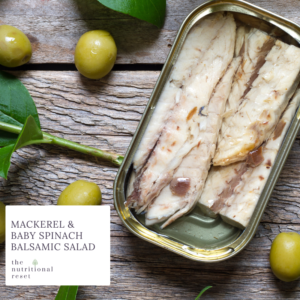 I realize I may be wading into uncharted waters this month by sharing a recipe for Mackerel & Baby Spinach Balsamic Salad, which features canned mackerel. But I hope this post encourages those of you who haven’t yet tried it to do so. And that you’ll be hooked thereafter, like I am.
I realize I may be wading into uncharted waters this month by sharing a recipe for Mackerel & Baby Spinach Balsamic Salad, which features canned mackerel. But I hope this post encourages those of you who haven’t yet tried it to do so. And that you’ll be hooked thereafter, like I am.
This salad is a staple in my lunch rotation because it’s fast and easy to make and yet has a solid thirty-one grams of protein as well as anti-inflammatory omega-3 fatty acids and a significant amount of vitamin B12. It’s also incredibly tasty!
What makes it so fast and easy is that I buy Gold Seal Wild Mackerel, which is boneless and skinless and comes packed in olive oil. So, unlike canned salmon or sardines, I don’t have to spend time fiddling about to remove skin or bones. I just tip in the entire contents of the tin in and flake it up a bit. A drizzle of balsamic vinegar completes the dressing since the olive oil is, literally, in the can. Using pre-washed baby spinach (or arugula or kale etc.) really makes it a snap to prepare. The recipe calls for three cups spinach but feel free to use more. Dark leafy greens are super healthy and the fat in the canned mackerel will help your body absorb their vitamin K.
If you want to amp up the carbs and fibre, feel free to add boiled potatoes, pasta or grains (I give suggestions in the recipe notes). I also enjoy this salad with rye crisps on the side. Thinly sliced raw beets are a delicious addition too. Their earthiness works well with the oily fish and goat cheese in the salad and they add beautiful colour and crunch.
Click here for the recipe and then read on for more about why a tin of mackerel is so fin-tastic for your health. I’ve also included a bonus recipe: a seasonal yet simple dessert. But here’s the deal…you can have dessert only if you eat all your mackerel! 😉
Sign up to my newsletter today and you’ll receive each month’s recipe straight to your inbox!
The holy mackerel trinity of health
 So what makes canned mackerel such a good catch? For one, most of us don’t eat enough fatty fish and canned fish has a long shelf life. So eating canned mackerel and other fatty fish (like salmon or sardines) once or twice a week is an easy and convenient way to increase our intake.
So what makes canned mackerel such a good catch? For one, most of us don’t eat enough fatty fish and canned fish has a long shelf life. So eating canned mackerel and other fatty fish (like salmon or sardines) once or twice a week is an easy and convenient way to increase our intake.
Fatty fish is one of the richest sources of omega-3 fatty acids. Omega-3 fatty acids are crucial for maintaining overall health and yet our bodies cannot produce them on their own. So they must be obtained through the diet. This is why they are often referred to as essential fatty acids (in the same way some amino acids are deemed essential).
Omega-3 fatty acids are:
- excellent at reducing inflammation,
- critical to healthy heart and
- vital for brain development and function.
They can significantly reduce triglyceride levels, help maintain healthy blood pressure, prevent blood clots and contribute to stable heart rhythms, all of which lower the risk of heart disease and stroke.
DHA, a key omega-3, is a major component of brain tissue, supporting cognitive function, memory, and learning.
Omega-3 fatty acids have strong anti-inflammatory properties and can help reduce inflammation throughout the body. This is in part why they are so good for heart and brain health. But they also may be beneficial for conditions like rheumatoid arthritis, for example, helping to reduce pain, swelling, and stiffness.
B12 booster
One standout you may notice in the nutritional breakdown of this recipe is that it provides 329% of the recommended daily amount of B12. Mackerel is one of the richest sources of B12 available. Yes, beef liver provides quite a bit more, but I’d wager that beef liver is a food that even fewer of you would wish to tackle. And perhaps because my mom hated liver, I’ve never really caught on to it.
Vitamin B12 is crucial for maintaining a healthy body. It plays a vital role in nerve function, red blood cell formation and DNA synthesis. It also contributes to brain health, energy production, and may help prevent certain health conditions like anemia and heart disease.
Sadly, as we get older (beyond 50), our bodies become less efficient at absorbing it from animal products. This is due to a decline in stomach acid and intrinsic factor, which are crucial for detaching B12 from food proteins and facilitating its absorption. Which is why health care providers may recommend B12 supplementation in our later years, even if we are consuming sufficient amounts in our diet.
Bonus dessert
I promised a seasonal yet simple dessert to lure you into reading to the very bottom of this post. So here’s the buried treasure: Strawberry Coconut Frozen Yogurt. Strawberries are in season now so should be beautifully sweet. And be sure to use a really excellent quality coconut yogurt, like this one from Canada’s own Yoggu. Enjoy! Just remember our deal…you have to eat your mackerel first!
Bonus points
…for catching all the fish puns in this post. And for adding any others that float your boat in the comments below!